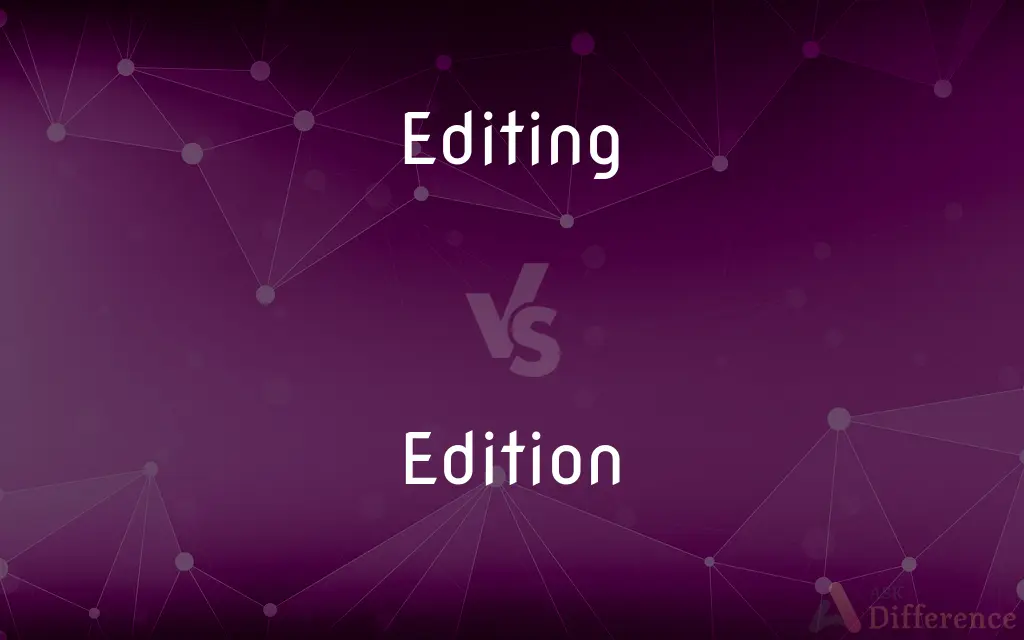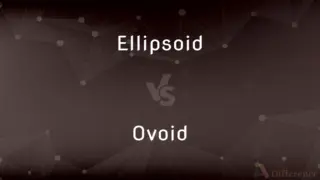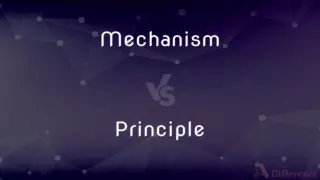Editing vs. Edition — What's the Difference?
Edited by Tayyaba Rehman — By Urooj Arif — Updated on April 5, 2024
Editing involves the process of correcting and preparing text for publication, while edition refers to a particular form or version of a published work.

Difference Between Editing and Edition
Table of Contents
ADVERTISEMENT
Key Differences
Editing is a comprehensive process that includes revising, correcting, and formatting text or content to improve its clarity, quality, and coherence before it is published. This process may involve structural changes, proofreading for grammatical errors, and ensuring consistency in style and tone. On the other hand, an edition refers to a specific version of a text or published work that has been released. It could denote a particular print run, a version with alterations or updates, or a format that is distinct from previous releases, such as a hardcover or paperback edition of a book.
In the context of publishing, editing is a necessary step to refine and polish a manuscript or any piece of writing to make it suitable for its audience. Editors work on the content to ensure it meets certain standards and fulfills the purpose it is intended for. Whereas, an edition signifies the outcome of the publishing process, highlighting variations in the publication that might arise from updates, corrections made after initial publication, or adaptations for different markets.
Editing focuses on the content itself, looking at language, accuracy, and presentation, and can be applied to various media, including books, articles, and digital content. The role of an editor is crucial in shaping the final product, ensuring that it communicates effectively with its intended audience. Edition, however, focuses more on the form and distribution of the content, often implying a collective set of copies that share characteristics distinguishing them from other sets.
The term "editing" can also encompass a range of specific activities depending on the content being worked on, such as video editing, sound editing, or photo editing, where the goal is to enhance the original material's quality and impact. Editions, in contrast, are more commonly associated with literary and academic publications, where distinctions between different editions can be crucial for readers and scholars seeking the most accurate or authoritative text.
While editing is a continuous and dynamic process that may evolve with the content, an edition is a fixed point in the publication history of a work, marking a specific version at a specific time. Subsequent editions of a work often reflect significant editing work that incorporates new findings, corrections, or updates to keep the content relevant and accurate.
ADVERTISEMENT
Comparison Chart
Definition
The process of revising and preparing content for publication.
A specific version or form of a published work.
Focus
Content quality, clarity, and coherence.
The form, format, or version in which a work is published.
Involves
Proofreading, formatting, structural changes.
Printing runs, updates, format changes (e.g., hardcover).
Purpose
To improve and refine content before it reaches the audience.
To differentiate between versions or releases of a work.
Applied to
Texts, videos, photos, digital content.
Books, academic papers, software.
Outcome
A polished, final version of the content ready for publication.
A distinct set of copies with unique characteristics.
Role in Publishing
Essential for preparing content for public consumption.
Marks the evolution and variations of a published work.
Compare with Definitions
Editing
Correcting errors.
Editing ensures that spelling and grammar mistakes are corrected.
Edition
Different format releases.
The novel was released in both a hardcover edition and a paperback edition.
Editing
Enhancing clarity and readability.
The editor focused on editing the article for better clarity and flow.
Edition
Specific version of a book.
The second edition of the textbook includes the latest research findings.
Editing
Structural changes.
Significant editing can include reorganizing chapters or sections for improved coherence.
Edition
Updates or revisions.
The revised edition contains corrections and additional chapters.
Editing
Adjusting style and tone.
Editing was necessary to align the text with the publication's style guide.
Edition
Limited or special editions.
The special edition of the novel features illustrations and a signed bookplate.
Editing
Revising written content.
The manuscript went through several rounds of editing before publication.
Edition
Academic and literary importance.
Scholars often seek the first edition of classic works for their research.
Editing
Editing is the process of selecting and preparing written, photographic, visual, audible, or cinematic material used by a person or an entity to convey a message or information. The editing process can involve correction, condensation, organisation, and many other modifications performed with an intention of producing a correct, consistent, accurate and complete piece of work.The editing process often begins with the author's idea for the work itself, continuing as a collaboration between the author and the editor as the work is created.
Edition
A particular form or version of a published text
A paperback edition
Editing
To prepare (written material) for publication or presentation, as by correcting, revising, or adapting.
Edition
The total number of copies of a book, newspaper, or other published material issued at one time
Variations occurred after some of the edition had already been published
Editing
To prepare an edition of for publication
Edit a collection of short stories.
Edition
A particular instance of a regular radio or television programme
The Monday edition will be repeated on Wednesdays
Editing
To modify or adapt so as to make suitable or acceptable
Edited her remarks for presentation to a younger audience.
Edition
The entire number of copies of a publication issued at one time or from a single set of type.
Editing
To supervise the publication of (a newspaper or magazine, for example).
Edition
A single copy from this group.
Editing
To assemble the components of (a film or soundtrack, for example), as by cutting and splicing.
Edition
The form in which a publication is issued
A paperback edition of a novel.
An annotated edition of Shakespeare.
Editing
An act or instance of editing
Made several last-minute edits for reasons of space.
Edition
A version of an earlier publication having substantial changes or additions
A newly revised edition of a standard reference work.
Editing
Present participle of edit
Edition
All the copies of a specified issue of a newspaper
The morning edition.
The Sunday edition.
Editing
An act or instance of something being edited.
Edition
A broadcast of a radio or television news program
Thursday's edition of the six o'clock news.
Editing
Putting something (as a literary work or a legislative bill) into acceptable form
Edition
The entire number of like or identical items issued or produced as a set
A limited edition of early jazz recordings.
A signed edition of a group of lithographs.
Edition
Any of the various or successive forms in which something is offered or presented
This year's edition of fall fashions from Paris.
Edition
One that closely resembles an original; a version
The boy was a smaller edition of his father.
Edition
(publishing) A written work edited and published, as by a certain editor or in a certain manner, or at a certain time.
She wanted a copy of the Clericotes edition, but had to settle for the 1921 edition. She had never liked abridged editions.
Edition
The whole number of copies of a work printed and published at one time.
The first edition was soon sold.
Edition
An instance of [1] or [2]:
What he had found was a particularly valuable first edition.
Edition
(sport) A particular instance of an event.
The 2014 edition of the Tour de France started in Leeds, Yorkshire.
Edition
A literary work edited and published, as by a certain editor or in a certain manner; as, a good edition of Chaucer; Chalmers' edition of Shakespeare.
Edition
The whole number of copies of a work printed and published at one time; as, the first edition was soon sold.
Edition
The form in which a text (especially a printed book) is published
Edition
All of the identical copies of something offered to the public at the same time;
The first edition appeared in 1920
It was too late for the morning edition
They issued a limited edition of Bach recordings
Edition
An issue of a newspaper;
He read it in yesterday's edition of the Times
Edition
Something a little different from others of the same type;
An experimental version of the night fighter
An emery wheel is a modern variant of the grindstone
The boy is a younger edition of his father
Common Curiosities
What is the difference between editing and edition?
Editing is the process of revising content, while an edition is a specific version of a published work.
Can a book have multiple editions?
Yes, a book can have multiple editions, each potentially including updates, corrections, or new materials.
How does editing affect the final product?
Editing improves the quality, clarity, and coherence of the content, making it more effective and engaging for the audience.
Why are different editions published?
Different editions are published to update content, introduce new features, or produce variations suited to different audiences.
Can editing change the meaning of the content?
While editing aims to clarify and refine content, careful editing is necessary to ensure the original meaning is preserved and enhanced.
How do I know which edition of a book to use?
The choice of edition may depend on your needs, such as the most current information or specific features unique to a particular edition.
Is editing only related to text?
No, editing can apply to various forms of media, including text, video, audio, and images.
What does a revised edition mean?
A revised edition means the work has been updated or corrected from its previous publication.
Does every publication go through editing?
Ideally, yes, every publication should go through some level of editing to ensure accuracy and readability, although the extent of editing can vary.
Are digital publications also considered editions?
Yes, digital publications can have different editions, just like print publications, reflecting updates or different formats.
Share Your Discovery

Previous Comparison
Ellipsoid vs. Ovoid
Next Comparison
Mechanism vs. PrincipleAuthor Spotlight
Written by
Urooj ArifUrooj is a skilled content writer at Ask Difference, known for her exceptional ability to simplify complex topics into engaging and informative content. With a passion for research and a flair for clear, concise writing, she consistently delivers articles that resonate with our diverse audience.
Edited by
Tayyaba RehmanTayyaba Rehman is a distinguished writer, currently serving as a primary contributor to askdifference.com. As a researcher in semantics and etymology, Tayyaba's passion for the complexity of languages and their distinctions has found a perfect home on the platform. Tayyaba delves into the intricacies of language, distinguishing between commonly confused words and phrases, thereby providing clarity for readers worldwide.
















































